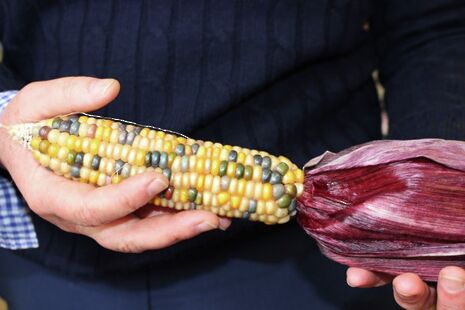DeskSpace: Kernels of Corn
Professor Sarah Franklin shares her thoughts on the politics of reproduction and what it means to be a small kernel of corn in a much wider landscape

As I enter Professor Sarah Franklin’s office at The Department of Sociology, a pair of soft brown eyes stare up at me curiously from a padded blue cushion in the corner of the room.
“Poppy go and say hello!” Professor Franklin says, and a bouncy little dog bounds towards me in a lovely brown flurry. “She’s just been for a swim in the Cam” Sarah tells me and joins me on the floor. “It’s one of her favourite things to do in Cambridge” she adds, giving the delighted Poppy a rub. The renowned Professor responds with Poppy-like enthusiasm when I ask her if she was also tempted to take a morning dip. “I have swum in the Cam on numerous occasions. I tend to swim a little bit further down and a little later in the year.” Sarah smiles. I’m struck by how down-to-earth the Professor, a pioneer in the social study of reproductive and genetic technologies, is as she amiably describes the relevance of the many objects and artifacts that make a treasure trove of her sunlit office. Sitting contentedly on the carpet Professor Franklin and I embark on a discussion about reproduction, social engagement, and what we can learn from a kernel of corn.
“Having things that stretch you out not just physically, but emotionally and mentally is important”
Rachel Loughran: Your office is full of absolutely glorious things. Are they inspired by your research?
Sarah Franklin: I do have lots of unusual things here. I think it's really important for academic teams and departments to have things to respond to and activities to do that remind them that they are a complete human being, not just a brain... I think it's very important for people to be a whole person, not holistic as in do yoga every five minutes, but to show that you have feelings, you have appetite, you have curiosity, you're a person with a whole sensory apparatus. [Poppy jumps up] “Yeah baby, you’ve got your ball.” Sarah says to the tail-wagging cockapoo.I try to do lots of activities with my research group [Reproductive Sociology Research Group] and with the department that are about getting out and walking, doing exercise, or having lunches where we share food, or bringing plants into the department or bringing dogs into the department.
RL: Do you feel that a desk environment can be sterile?
SF: I guess it's not so much anything about the desk environment per se, other than the fact that people’s workloads can mean that they spend a lot of time at their desks and obviously that's not great for you… Having things that stretch you out not just physically, but emotionally and mentally is important. I have small pieces of wood that I burn that give a really nice aromatic smell in the office. [Sarah lights a piece of wood with a match] I cut these myself. It’s Ewe. It’s a very, very aromatic piece of wood. You'll see you when I blow that out that's going to perfume the whole office. It's amazing what a difference that makes to an atmosphere, that tiny little olfactory sensation. I know that sounds kind of, well you know, but I'm just making a point – it doesn't take a lot to engage your senses more fully when you're at work, and for me the office really needs to be a place of engagement.
“Universities right now are in the middle of a lot of change in terms of what counts as a good education”
RL: Is there anything in your office my attention should be particular drawn to?
SF: On the window sill we have corn. My research group [and I] grew a whole field of corn at Murray Edwards this summer. It was part of a project about a geneticist named Barbara McClintock whom we are making a film about, and this is the kind of corn in that she grew.
RL: What kind of corn is it?
SL: This is a very old Native American corn, and the thing about the way the corn reproduces is that each piece of silk that comes out of the end of the cob goes to a specific kernel, so each kernel is separately fertilized. Each kernel is like an embryo. The corncob of this variety is handy as a model organism to understand the relationship between environment, reproduction, inheritance etc. Here, would you like a kernel? You can plant it.
RL: You can plant it just from that?
SF: Yeah! Take it! [Sarah hands me the kernel and continues] So, corn used to be grass, [she picks up the cob and points to the husk (ears)] it only like looks like this because people have interacted with that plant for millennia… it is very much the product of an interaction between the human and the plant, so we can't just think about corn reproduction in terms of each kernel as an embryo, we have to think about the wider picture that enables us to understand why, for example, a corn has ears... it’s a good analogy for the question of reproduction more broadly.
“I have got more sheep than anyone you’ll ever meet. I’ve got hundreds of sheep that people have sent me”
RL: How does reproduction manifest itself a broader sense?
SF: There is a sense that protein reproduction is part of a wider project of understanding the environment differently, of understanding the academy differently. The academy is very much about the politics of reproduction – it's all about reproducing the disciplines, reproducing a particular definition of a good education. Universities right now are in the middle of a lot of change in terms of what counts as a good education, so the reproductive mechanics of universities is changing. This is something that the Department of Sociology is very actively engaged in. It's very actively engaged in linking up social theories about the social forces that shape us and the social institutions in which that takes place, with a sense of social change. The Department of Sociology is trying to decolonize the curriculum, because it's important to reproduce a version of what an educated sociology graduate should be.
RL: Your work on reproduction seems to draw many elements into something holistic, which is also a feature desk space. Do you keep quite a variety of books here too, or are they mainly related to your work?
SL: [pointing to the shelf] These are mostly sociology, anthropology, science studies.
RL: Are you aware you share a name with a Mills and Boon novelist, also called Sarah Franklin?
SF: Oh, I have her books! And it’s quite funny, I can’t remember the title, but there’s one of them that sounds a little bit like the title of one my books. It’s just close enough that it could be one of my books!
RL: I also noticed a little sheep toy up on the bookcase peeking through, is that related to your work on Dolly the sheep?
SF: Yes, absolutely. I have got more sheep than anyone you’ll ever meet. I’ve got hundreds of sheep that people have sent me. When I wrote the book about cloning, [Dolly Mixtures] the point was, ok so there’s been a cloned sheep, well why is the only question people ever ask about the cloned sheep, should humans be cloned? Because that’s just one extremely narrow question… if we put Dolly at the centre, we can see the much larger politics of reproduction that surround her.
RL: Do you ever get tired of the receiving sheep gifts?
SF: No. It’s quite sweet actually. Someone recently sent me one in a match box, and it said, “for Dolly a perfect match”.
RL: Very clever.
SF: Very.

 News / Caius mourns its tree-mendous loss23 December 2025
News / Caius mourns its tree-mendous loss23 December 2025 News / Clare Hall spent over £500k opposing busway 24 December 2025
News / Clare Hall spent over £500k opposing busway 24 December 2025 Comment / The ‘class’ of Cambridge24 December 2025
Comment / The ‘class’ of Cambridge24 December 2025 Comment / Yes, I’m brown – but I have more important things to say22 December 2025
Comment / Yes, I’m brown – but I have more important things to say22 December 2025 Interviews / Politics, your own way: Tilly Middlehurst on speaking out21 December 2025
Interviews / Politics, your own way: Tilly Middlehurst on speaking out21 December 2025








